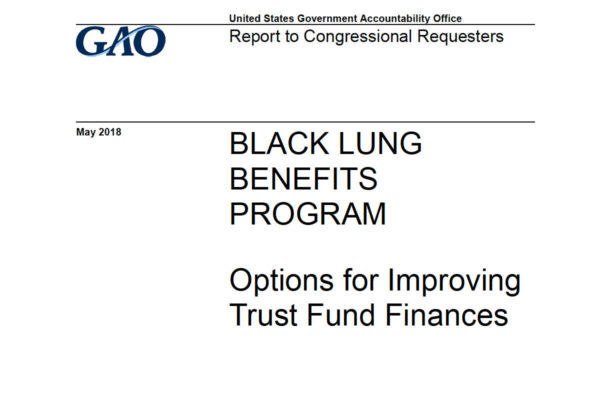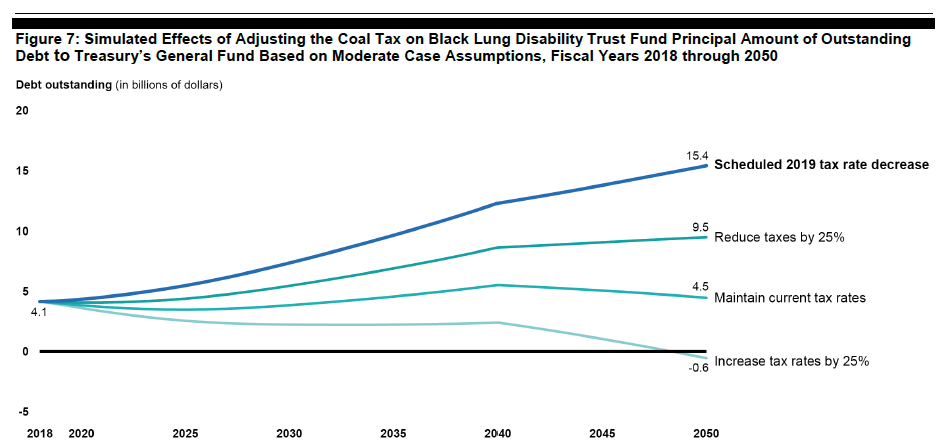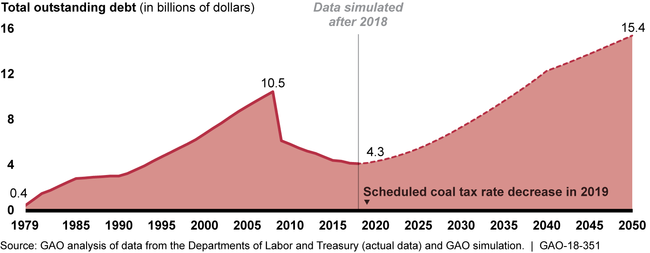Watchdog Report by GAO Finds Black Lung Trust Fund Debt to Spiral Unless Congress Acts

Yesterday, the U.S. Government Accountability Office (GAO) released a major report about the black lung benefits system.
The report looked at the finances of the Black Lung Disability Trust Fund: the public fund that Congress created in 1977 to pay federal black lung benefits when there’s no solvent coal company or insurer who can be held responsible.
Members of Congress asked for the report because at the end of calendar year 2018, the tax on each ton of coal that is mined is set to automatically decline by more than half. And as readers of this blog know, this comes at a time when black lung disease is rampant and many large coal companies have gone bankrupt pushing more claims onto the Trust Fund.
As the below chart shows, the GAO projects the Trust Fund’s debt to soar unless Congress acts.
As we at Appalachian Citizens’ Law Center summarized here, the major findings are:
- If Congress does not act, the Trust Fund’s debt will increase by $11.3 billion (to $15.4 billion) by 2050. (GAO Report, at 19)
- Without action, revenue to the Trust Fund may not be enough to cover benefits and administrative costs for 2020 through 2050 (GAO report, at 15)
- Current black lung benefits are not the source of the Trust Fund’s problems. The Trust Fund is saddled with mountains of debt from the 70s and 80s. Even completely eliminating black lung benefits would still lead to a $6.4 billion debt. (GAO Report, at 22)
- If current tax rates are maintained, the Trust Fund’s debt would only increase slightly by 2050. (GAO Report, at 19)
- To balance the Trust Fund without a public bailout, coal tax rates need to increase by 25% (that is, an increase of 28¢ per ton on underground coal and 14¢ per ton on surface-mined coal). (GAO Report, at 25)
Below is a key chart from the report showing how that various tax rates would affect the Trust Fund’s future debt levels. 
For more coverage and info on the report, see these stories from CNN, NPR, Reuters, The Hill, and The Ohio Valley ReSource.
I draw your attention to the coal miners who are interviewed. I’m particularly proud of my client Kenny Fleming of Pike County, Kentucky who spoke with CNN and said:
“Coal miners are dedicated, hard-working, great people. It’s a dangerous job. It’s a hard job,” he added. “It just seems like coal miners are used for what they’re worth, and when it’s time to compensate them for their hard work and their dedication, they’re forgotten sometimes.”
Sheralin Greene of Harlan County, Kentucky also spoke well for coal miners in the NPR piece:
“It’s not our fault that we got this disease,” says former miner Sheralin Greene. “We did keep the lights on … We were just trying to help America … They better take care of the coal miners.”
On the other side of this debate the coal lobby is arguing that it should not have to pay for the additional cost of black lung.
Cecil Roberts, the President of the United Mine Workers of America, stated the union’s response directly: “Coal operators caused this problem, and they are the ones who should be responsible for funding the compensation these workers receive.”
At this time, no legislation has been filed to address the future of the Trust Fund. However, a bill appears imminent now that this GAO report provides the factual details to inform Congress of what needs to be done to protect the Black Lung Disability Trust Fund—a critical part of the safety net for coal-mining families suffering from black lung.
